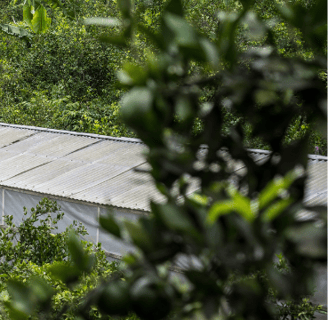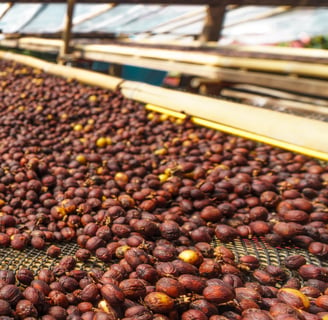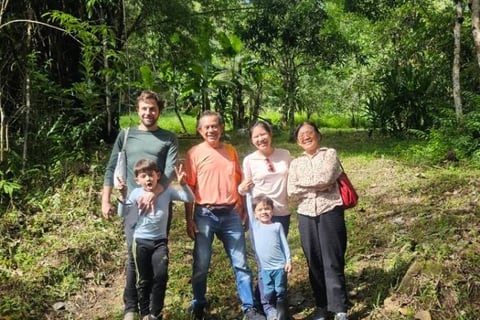
Meet Jardin de Claude: Where Innovation Meets Tradition in the Thai Highlands
Beyond Vietnam and Indonesia, Jardin de Claude is crafting unique Thai specialty coffee in northern Thailand.
Ashok Srisenthuran
4/7/20254 min read


Meet Jardin de Claude: Where Innovation Meets Tradition in the Thai Highlands
When most coffee enthusiasts think of Southeast Asian coffee, their minds often drift to Vietnam's robust robusta or the familiar profiles of Indonesian islands. But tucked away in Thailand's northern mountains, a remarkable transformation is taking place at Jardin de Claude, where a young couple is redefining what Thai specialty coffee can be.
A Farm Reborn
Nestled in the verdant hills of Doi Saket at 1,200 meters above sea level, Jardin de Claude has a history that mirrors the complex evolution of Thailand's agricultural landscape. While the farm dates back many decades, its newest chapter began in 2020 when Emmanuel and Sai, a French-Thai couple with a shared vision, took over the estate during the challenging times of the COVID-19 pandemic.
What others might have seen as an insurmountable challenge, Emmanuel and Sai recognized as an opportunity. The timing may have seemed inauspicious, but their passion for quality coffee and sustainable agriculture gave them the determination to persevere when global supply chains were disrupted and tourism—a major economic driver in Thailand—had ground to a halt.
From Notorious Past to Bright Future
The hills where Jardin de Claude now thrives carry whispers of a more controversial history. In the 1950s, this region—part of the infamous Golden Triangle bordering Laos, Thailand, and Myanmar—was known for opium cultivation. The same environmental conditions that once made these highlands ideal for poppy fields—high altitude, cool nights, and mineral-rich soil—now contribute to producing exceptional coffee with remarkable complexity.
This transformation from opium to arabica represents not just an agricultural shift but a social one. What was once a crop associated with conflict and hardship is now a source of pride, economic stability, and international recognition for the region.
Varieties: Honoring Tradition While Embracing Innovation
The coffee trees at Jardin de Claude represent both the established traditions of Thai coffee and the couple's forward-thinking approach. Their fields include:
Typica: One of the oldest coffee varieties, known for its clean cup and subtle complexity
Catimor: A hybrid variety that offers disease resistance while still delivering quality flavor
Bourbon: Celebrated for its sweet, balanced profile and bright acidity
Geisha: Newly planted, this prestigious variety is known for its floral aromatics and exceptional cup quality
The inclusion of Geisha—a variety that has broken price records at international auctions—demonstrates Emmanuel and Sai's commitment to pushing boundaries and their confidence in their terroir's potential.


Processing Innovation: Beyond the Conventional
Perhaps most impressive is Jardin de Claude's experimental approach to processing. Rather than relying solely on traditional methods, Emmanuel and Sai have become processing innovators, implementing:
Red Honey Process: Where a specific amount of mucilage is left on the bean during drying, creating sweet, fruit-forward profiles
Pink Honey Process: A variation offering a middle ground between red honey and traditional honey processing
48-Hour Anaerobic Fermentation: Fermenting coffee cherries in oxygen-deprived environments to develop unique flavor characteristics
Natural Process: Sun-drying whole cherries for intense sweetness and fruit notes
Washed Process: For clean, bright cups that highlight the bean's inherent qualities
This variety of processing methods allows Jardin de Claude to create numerous distinct flavor profiles from the same harvest, each highlighting different aspects of the bean's potential.
Sustainability as a Core Value
For Emmanuel and Sai, exceptional coffee and environmental stewardship go hand in hand. Their comprehensive approach to sustainability includes:
Shade-Grown Cultivation: Coffee trees grow under a canopy of native trees, preserving habitat and improving coffee quality
Agroforestry Practices: Integrating trees and shrubs into their agricultural system to enhance biodiversity
Organic Fertilizers: Using compost and natural amendments rather than synthetic chemicals
Water Management: Implementing systems to conserve water and prevent runoff
Soil Conservation: Preventing erosion through thoughtful planting and maintenance
Biodiversity Preservation: Creating an ecosystem where coffee thrives alongside native plants and wildlife
Fair Trade Practices: Ensuring equity throughout their supply chain
Ethical Labor Practices: Providing fair wages and safe conditions for all workers
These practices not only protect the environment but also contribute directly to the quality and distinctiveness of their coffee.
A Symphony of Flavors
The combination of Jardin de Claude's unique terroir, careful variety selection, innovative processing, and sustainable practices results in cups with remarkable complexity. Depending on the variety and processing method, their coffees express notes of:
Tomato and roselle tea
Wild honey and star anise
Bright citrus
Complex herbal tea
Nutty undertones
Fresh berries
Tropical fruits
Rich cacao nibs
This diversity of flavor reflects not just the coffee itself but the care and intention behind every step of its journey.


The Farmers: Emmanuel and Sai
At the heart of Jardin de Claude are Emmanuel and Sai themselves—a young couple balancing their passion for exceptional coffee with the realities of family life. Neither came from a traditional coffee background, and they approach each season with a learner's mindset, constantly experimenting, adapting, and improving.
Their story is not one of coffee dynasty or inherited expertise, but rather of determination, curiosity, and a willingness to take risks. They represent a new generation of coffee producers who bring fresh perspectives to traditional farming, blending respect for established methods with openness to innovation.
The One Estate Experience
When you brew a cup of Jardin de Claude coffee from One Estate, you're experiencing more than just beans from Thailand. You're tasting the culmination of historical transformation, geographical advantage, varietal selection, processing innovation, and the personal journey of two dedicated farmers.
This is why we believe so strongly in the single estate model—because coffee at its best tells a complete story that can't be replicated or blended away. Each sip of Jardin de Claude connects you directly to a specific place, time, and the people who made it possible.
Next week: We'll journey from the mountains of Thailand to our second partner estate, where a completely different geography creates an entirely new coffee experience.
© 2024. One Estate. All rights reserved.


